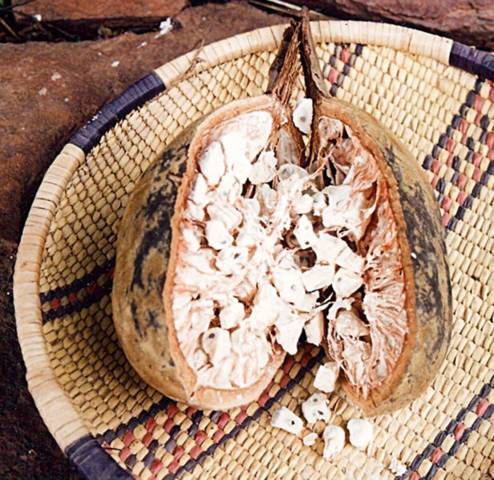

FOB Price
Get Latest Price|
- Minimum Order
Country:
Kenya
Model No:
n/a
FOB Price:
Place of Origin:
-
Price for Minimum Order:
-
Minimum Order Quantity:
-
Packaging Detail:
-
Delivery Time:
-
Supplying Ability:
-
Payment Type:
-
Product Group :
-
Kenya
Contact Person Mr. Edward
kwahola, mombasa, coast
mealy powder. Baobab is a popular food source. The fruit pulp is commonly sucked, chewed or made into a drink when mixed with water or milk, either with or without sugar, or as a supplement to mix with staple food such as corn meal and cassava. Other uses for baobab pulp include sauces for food, hair rinse, milk curdling agent and a sub-stitute for cream of tartar, among other things. When burned, it is a good repellent for cattle flies (Kurebgaseka, ***5).
The pulp is very nutritious. Arnold et al. (***5) reported that with an average of 8.7% moisture, the pulp contains about *4% carbohydrates, 3% proteins, 9% fi-bers, 6% ash and only 0.2% fat. The content of pectin is approximately *6% (Nour et al., ***0), which is why the pulp is traditionally used as a base for jam making. It is also characterized by a high vitamin C (ascorbic acid), calcium, phosphorus and potassium content. The acidulous taste is attributed to the presence of organic acids, such as citric acid, tartaric acid, malic acid and succinic acid.
Baobab fruit pulp has a particularly high antioxidant capability mainly because of its high natural vitamin C content, which is equivalent to 6 oranges per **0 g. Anti-oxidants protect the cells of organisms from damage by free radicals. A deficiency of vitamin C weakens the immune system and promotes the susceptibility to disease. Deficiency of vitamin C also results in scurvy. The recommended daily allowance (RDA) for ascorbic acid is *5 mg for women and *0 mg for men. If we consider that baobab has an ascorbic acid content of **0 mg per **0 g pulp, the oral intake of *5 and *0 g respectively is able to provide to the daily vitamin C allowance required by humans. Additionally, vitamin C aids the bodily uptake of iron and calcium, of which the fruit pulp contains more than double than the same amount of milk. Therefore, in some areas, it is used as a milk substitute for babies.
| Country: | Kenya |
| Model No: | n/a |
| FOB Price: | Get Latest Price |
| Place of Origin: | - |
| Price for Minimum Order: | - |
| Minimum Order Quantity: | - |
| Packaging Detail: | - |
| Delivery Time: | - |
| Supplying Ability: | - |
| Payment Type: | - |
| Product Group : | - |